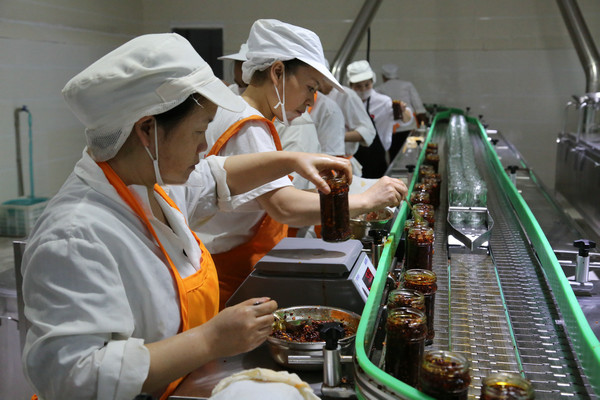 |
|
An assembly line of Xiangxiamei Food in Guiyang that produces chili sauce. [Photo by Yang Jun/China Daily] |
While many of China's northern cuisines are relatively bland in taste, the southwest and central provinces tend to offer spicier dishes, thanks in part to the chili cultivation. In Guizhou, for instance, the market for chili condiments is estimated to be 10 billion of the country's total 40 billion yuan.
A visit to a factory of Guiyang-based Guizhou Xiangxiamei Food Co Ltd shows how such sauces and pastes are produced through an assembly line. First the chilies are washed; then processed with peanuts in oil at temperatures above 100 C; after which salt and other ingredients are added; and finally the bottles are sealed, packed and sent.
Among the province's recognized companies in the sector, Xiangxiamei Food's two factories produce nearly 20,000 bottles a day, of which 4 percent is exported to the United States, France and Spain, targeting the Chinese population there. The rest is consumed at home.
The company uses "medium spicy" chilies for its sauces, bottles of which cost 9 yuan on average.
It buys up to 3,000 tons of chili each year from farms located mostly in Hezhang, a county in Guizhou's northeast bordering Sichuan and Yunnan, the two other spice hubs of China. The chilies are grown over hundreds of hectares along with tomato, garlic and ginger-other vegetables needed for the condiments.
Of course, like many other food and beverage makers worldwide, the popularity of the company's products is perhaps related to a component, way of mixing or legend.
"It's a business secret," says the deputy manager Chen Yanxiong.
Founded in Guiyang in 1994 by Deng Shengyi, then a 25-year-old migrant from Jinsha County in the province's south, the company now employs 120 people and has an annual income of about 30 million yuan, with profit in several millions. The owner's journey began with four relatives and friends, and an investment of 2,500 yuan.
The only major loss Deng suffered in all these years was in 2008 due to the global recession that hit many sectors, says Chen, whose boss couldn't do the interview as he was traveling.
"When they bought this land (site of the factory), it was in the outskirts. But now it is the center of the city," Chen says of Guiyang. He joined the company eight years ago.
|
|
|
|
|
|
|
|
